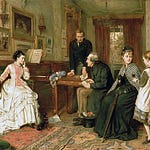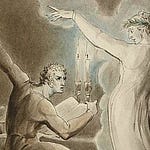When the poet Edmund Spenser wrote our Poem of the Week, it was as a part of the most wonderful wedding-gift a husband could give to his new wife. Spenser was then a widower, in his early forties, and he had met a beautiful young woman named Elizabeth Boyle, with whom he fell in love, courting her over the course of a year and more, when she finally agreed to marry him. Lady Diana Spencer, by the way, was a lineal descendant of theirs. But back to the gift: it’s called Amoretti and Epithalamion. “Amoretti” means “Little Loves,” that is, Cupids; and an epithalamion is a poem commemorating a wedding day. We’ve discussed the central poem of the work as a whole, sonnet 59, "Thrice happy she, that is so well assured", and that poem and the one we’re presenting today show us that the persona of the speaker knows well that his beloved is a woman of great virtue, beauty, and piety. Unlike the love that most other sonneteers write about and usually subject to keen satire, Spenser’s love is meant to be fulfilled in marriage, and it directs his heart and mind toward divine love, not away.
But what does this have to do with fire? Well, it’s no surprise that poets have used fire as a symbol for what we feel when we’re in love: burning, flaming, active, restless, but often also consuming, scorching, destructive. The Italian poet Petrarch, whose love sonnets every poet for almost 300 years imitated or satirized or wrestled with, said famously that love had him freezing in fire and burning in ice. That wasn’t just supposed to be a nifty ironic figure of speech. Petrarch was getting at the contradictions inherent in a love that isn’t charity — even if it wasn’t sheer lust, as in his case it did not seem to be. Any love that reverses the order of the divine and the human, the Creator and the creature, is going to entangle the lover in contradictions; that’s what the poets took for granted, as an inevitable law of the world we live in.
But for Spenser — and please forgive me if I don’t draw a bright line here dividing the poet Spenser from his persona in the poems, the “Spenser” narrator he pretends to be — for Spenser, the love of Elizabeth Boyle elevates his soul. That’s because her eyes are “full of the living fire,” the fire of God himself, imparted to his creatures in varying degrees, depending on how close they are to him in their created nature. In the next sonnet, number 9, the companion to ours today, Spenser will say that Elizabeth’s shining eyes are not to be compared to the sun or the moon or the stars; they are beyond all those in their power and their virtue. They are, he concludes, most like “the Maker’s self,” “whose light doth lighten all that we here see.”
Other than admiration, what effect does the living fire that dwells in the lady’s eyes cause in him? Think here of a reversal of expectations. He is, well, if not old, certainly not young, as she is. He’s seen a great deal of the world, and, in strife-riven Ireland where Queen Elizabeth sent him as an aide to her severe governor Lord Grey de Wilton, perhaps he’s seen more than enough. But she, not he, is the teacher — or rather, it’s her eyes and their light, shining from within by the fire of God. He may have his unruly desires, but her virtuous eyes teach them their rightful bounds. Thoughts may come into his mind, and words to his lips, but her eyes, the looks in her eyes, restrain, direct, shape, and elevate them. He may feel he’s all thunder and lightning within, but her eyes calm that interior storm. Please do not think that he’s engaging in a pretty exaggeration. He really does mean what he says: that’s where the drama lies, after all.
More than most fair, full of the living fire, kindled above unto the Maker near, no eyes but joys, in which all powers conspire, that to the world naught else be counted dear: Through your bright beams doth not the blinded Guest shoot out his darts to base affection's wound? But angels come to lead frail minds to rest in chaste desires, on heavenly beauty bound. You frame my thoughts and fashion me within, you stop my tongue and teach my heart to speak, you calm the storm that passion did begin, strong through your cause, but by your virtue weak. Dark is the world where your light shined never; well is he born, that may behold you ever.
Note: Our full archive of over 1,000 posts, videos, audios is available on demand to paid subscribers. We know that not everyone has time every day for a read and a listen. So we have built the archive with our readers in mind. Free subscribers have access to a good number of our most recent posts. Please do browse, and please do share posts that you like with others.
Thank you, as always, for supporting our effort to restore every day a little bit of the good, the beautiful, and the true.













Share this post